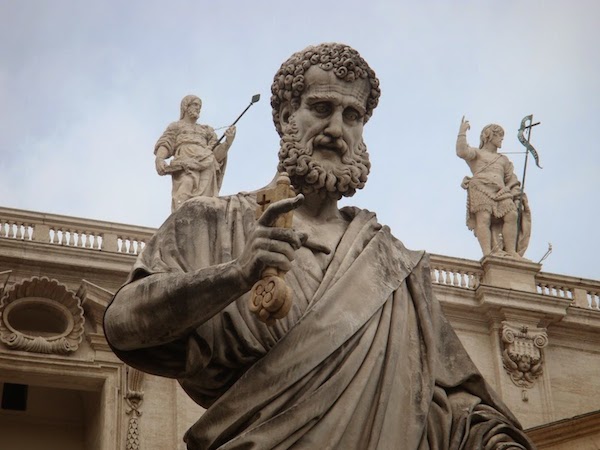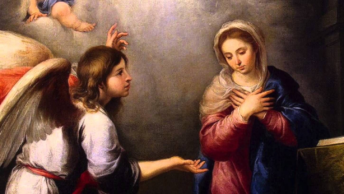
Once there was a funeral for a man named Glenn—a recovered alcoholic. A passage from 2 Timothy (4:6-8, 17-18) was read at his funeral, and it seemed very appropriate because of the words, “I have finished the race, I have kept the faith.” Those who knew Glenn also smiled at St. Paul’s words, “I am being poured out like a libation,” meaning the ceremonial pouring of wine on the ground as a religious ritual—for Glenn was widely known for pouring himself out: first as a drinker struggling with alcohol, and then later as a recovering alcoholic who became active in his parish and helped many people as a friend, sponsor, and mentor (This Sunday’s Scripture, June 29, 2003). In his weakness, Glenn was an example of what one author (Fr. Henri Nouwen) calls “the Wounded Healer”: a person who helps others even though he himself is far from perfect. The 19th century philosopher Sóren Kierkegaard once wrote, “God creates out of nothing. Wonderful, you say. Yes, to be sure, but He does what is still more wonderful: He makes saints out of sinners.” The Feast of Saints Peter and Paul provides the perfect illustration of this. Peter and Paul would have been the most unlikely candidates imaginable for leadership in the early Church. Peter was simple, uneducated, prone to exaggeration, and unreliable when the going got tough; Paul was proud, uncompromising, prejudiced against Christians, and the Church’s fiercest enemy. Even as apostles these two men only grudgingly accepted each other at first, and on at least one occasion had a serious dispute. Nevertheless, God’s grace made them saints— which means there’s hope for all of us. The Lord God will do wonderful things in us, for us, and through us, if only we give Him our trust.
One of the great things about being a follower of Jesus Christ is that we know we’re on the winning side. History is filled with examples of kings, tyrants, and governments who persecuted the Church; they’re all gone, but the Church remains. We see in the Acts of the Apostles (12:1-11) that the early Church in Jerusalem was attacked by King Herod Agrippa—the grandson of Herod the Great, who had tried to kill the infant Jesus. He executed St. James, the son of Zebedee, and then had Peter arrested for the same purpose. However, in response to the Church’s fervent prayers, God sent an angel, who miraculously set Peter free. St. Luke, the author of the Acts of the Apostles, wanted to show that God can accomplish what is humanly impossible, and that nothing can prevent the spread of the Gospel. As Jesus Himself promised Peter in the Gospel of Matthew (16:13-19), “Upon this rock I will build My Church, and the gates of the netherworld shall not prevail against it.” Jesus did not mean that Peter would suddenly become perfect, would never again sin, and would never die; He meant that, in spite of the human weaknesses of her members, the Church would always be the dwelling place and agent of the Holy Spirit, and a sure path of salvation to those who submit to her. This promise of final victory is made not only to the Church as a whole, but also offered to each of her members; it was through the power of the Holy Spirit, and his membership in the Church, that St. Paul was able to remain faithful to his mission in spite of every imaginable sort of danger and opposition.
We aren’t facing the dangers and sacrifices which confronted Peter, Paul, and the other apostles, and we’re not called to the sort of heroic and historic lives which they led, but each of us does have an important role to play in God’s plan—even if we consider this unlikely and ourselves unworthy. Many of us, like St. Peter, have to face and overcome what we might call the “Who, Me?” syndrome; we’re so overwhelmed with the knowledge of our inadequacies that we’re tempted to say, as Peter once did, “Leave me, Lord, for I am a sinful man, a sinful woman.” We can’t imagine that we would ever be able to say or do anything that would make a real difference in someone else’s life; we’re unreliable, or not all that intelligent or well-educated, or easily-flustered, or we tend to say or do embarrassing things—and we may even have betrayed Jesus by our serious sins. If so, Jesus says to us, as He once did to Peter, “Do you love Me? Feed My sheep”—in other words, “Let My Spirit guide you and work through you to touch others.” On the other hand, many of us, like St. Paul, have to face and overcome what we might call the “My Way is Best” syndrome; we’re so convinced we’re right that, like Saul of Tarsus before he became known as Paul after his conversion, we try to push people around and make persons and events conform to our will. We’re tempted to pride because of our knowledge and experience, and easily angered and offended when people dare to disagree with us; we find it easy to judge and criticize others, and in our prejudices and self-righteousness, we may even be working against the Church without realizing it and causing unnecessary suffering to her members. If so, Jesus says to us, as He once did to Saul of Tarsus on the road to Damascus, “Why are you persecuting Me?,” and then He calls us to let ourselves be enlightened and transformed into one of His apostles.
Whether we’re obsessed with our weaknesses, as Peter was, or blinded by our pride and prejudices, as Paul was, the antidote is humility. Humility doesn’t mean putting ourselves down; it means truthfully admitting our sins and failings, honestly acknowledging our strengths and abilities, and—above all—seeking God’s will first, trusting that He knows better than we do, and giving Him the credit for every good thing that happens. If we’re humble, we’ll be willing to help someone who needs our assistance, even when it’s inconvenient. If we’re humble, when someone else needs guidance, we’ll be given the right words to say at just the right moment. If we’re humble, we’ll seriously consider saying “yes” when someone asks us to get involved in a new ministry or new way of serving others. If we’re humble, we’ll be given the strength to witness to our faith and do the right thing without worrying about what other people might think. If we’re humble, the Holy Spirit will help us overcome our fears and our pride, our sins and our self-righteousness, our embarrassing mistakes and our tendency to come on too strong, and will work through us to touch other people, thereby helping spread the Gospel and build up the Church—while at the same time slowly but surely transforming us from sinners into saints.
Peter and Paul became holy and great not through their own efforts, but by allowing the Spirit of the Lord Jesus to live and work within them—and if they could do this, so can we. As Peter said to Jesus, “You are the Christ, the Son of the living God”—and if we too believe this in our hearts and proclaim it by our lives, we have Our Lord’s assurance that we will make a difference here on earth, and one day share in His joy in heaven.








